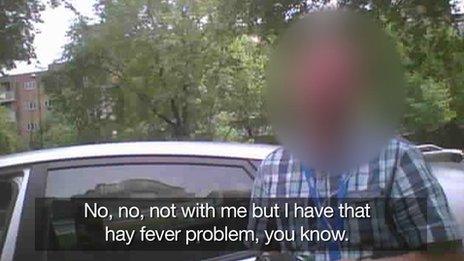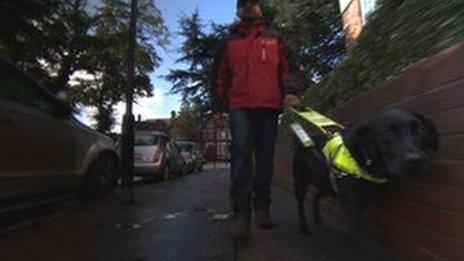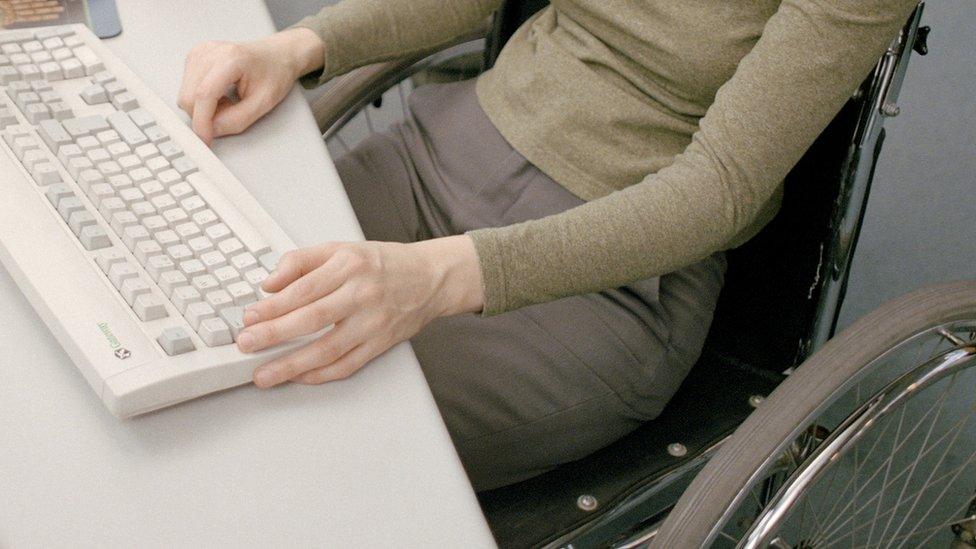Firms' disability access 'unlawful'
- Published

Five out of 20 cab firms tested by the BBC refused to take a guide dog
The government is writing to a string of high street chains urging them to improve after a BBC London investigation revealed a "depressing" failure to accommodate disabled people.
Two researchers, one blind, one a wheelchair-user, documented their daily travails with pinhole cameras.
Some of the UK's top chains failed to provide ramps - while five cabs refused to take a guide dog.
Several firms apologised while others promised to improve.
The Equality Act obliges organisations to make reasonable adjustments for disabled people.
But researchers found unusable tables or ramps missing or broken at branches belonging to Itsu, Costa Coffee, Eat, Caffé Nero, Caffé Concerto, Chipotle and the Post Office.
Researcher Christiane Link said: "I went from coffee shop to coffee shop - and either they had steps in front of their door or they only had high tables."
After experiencing problems in east London, BBC London test-booked 20 cabs to pick up a blind researcher. Five refused to take his clearly-marked guide dog.
One said: "Small dog, we can take it, but big dog we can't take it, we don't have the facilities."
The man was driving a people carrier.
Another said: "That will be extra money."
A third had a conversation with base on his radio - before claiming he could not take the dog because of "hay fever".
'Licence revoked'
Drivers with allergies must carry a card proving it, but he was unable to produce one.
Robin Allen QC, head of chambers at Cloisters and a leading expert in equality law, viewed the BBC's footage.
He said: "What I have seen in terms of the drivers who refused to take the guide dog appeared to be a clear case of a criminal offence."
Of the other companies, he said: "If they fail to make reasonable adjustments and an individual is denied access to facilities on an equal basis, they will be in breach of the law - the disabled people will be entitled to compensation."
BBC Inside Out has discovered continuing accessibility issues two years after the London 2012 Paralympics which heralded changing attitudes to disability
The Post Office carried out Ms Link's transaction in the street.
But Mr Allen said: "It is not reasonable, particularly with financial products or personal products, to expect wheelchair users to expect service in the street."
On four occasions, the wheelchair user got stuck on a train when staff booked to help did not arrive on time. She was unable to board a bus due to a faulty ramp.
Team GB wheelchair rugby player Ross Morrison said: "Getting on and off can be a really tricky issue. Quite often ramps aren't there.
"I've got good chair skills so I can bunny hop off the train - not safe, but I get away with it. For your average disabled person that's not an option."
A BBC London Freedom of Information request found disabled access complaints to TfL have almost trebled in three years - from 570 in 2011 to 1,431 in 2013.
The FoI revealed three legal actions between 2011 and present. All ended in out-of-court settlements - with £8,000 paid in damages and £41,673 for claimants' legal costs.

Lana the dog helped sniff out drivers who may be breaking the law
TfL said it had received only six complaints over guide dog refusals by minicabs in eight months, out of 45 million journeys.
Helen Chapman, TfL's general manager of taxi and private hire, said: "We take such incidents very seriously and anyone doing this faces having their licence revoked.
"We will thoroughly investigate any such instances - including those highlighted in the programme.
"The TfL network is one of the most accessible anywhere in the world - with a fully accessible and extensive bus service, step-free DLR network, and turn up and go assistance for disabled passengers across the Tube and London Overground networks."
Minister for Disabled People Mark Harper said: "I'm perplexed by the taxi story because I can't think of any plausible reason why they weren't able to take your researcher."
Of the wider findings, he said: "It's depressing. But we need to remember lots of firms do deliver good service."
Mr Harper has said he will write to the firms and consider redrafting guidance on minicabs.

High street responses
Costa said: "We have instructed our maintenance team to visit. We apologise for any inconvenience."
Caffé Concerto said: "We recognise our obligations under the Act and are constantly working to improve access."
Itsu said: "We are very sorry your researcher had difficulties eating at Itsu. This is not acceptable and we are rectifying this."
Eat said: "We are disappointed to have failed and would like to apologise."
Caffé Nero said: "We consider we make all reasonable provision with regards to access."
Chipotle said: "When this was brought to our attention, we made adjustments to ensure tables are accessible in all our restaurants."
The Post Office said: "We make endeavours to comply with regulations. We apologise for any inconvenience."

- Published23 October 2014
.jpg)
- Published15 October 2014
